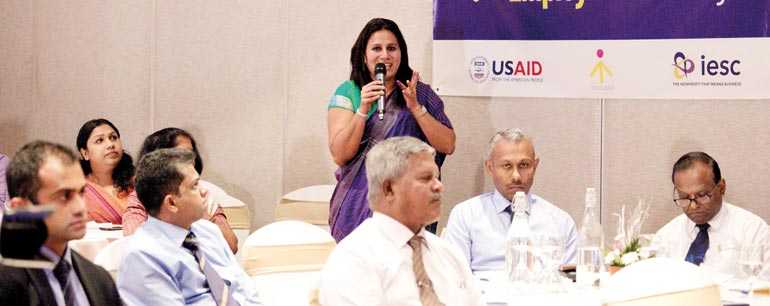Wednesday Feb 25, 2026
Wednesday Feb 25, 2026
Monday, 10 December 2018 00:00 - - {{hitsCtrl.values.hits}}

Expressing their commitment to improve vocational training, technical education, and enterprise development in Sri Lanka, 11 training institutes launched a set of common curricula for entrepreneurship training.
 |
USAID in Sri Lanka Office of Economic Growth Deputy Director Brian Wittnebel addressing the audience |
 |
YouLead Project Director Charles Conconi delivering the welcome speech |
The new curricula was developed in partnership with the US Agency of International Development (USAID)-funded Youth Employability and Business Start-up Program (YouLead) by officials from the Industrial Development Board, National Enterprise Development Authority, University of Vocational Technology, Vocational Training Authority, National Youth Services Council, National Apprentice and Industrial Training Authority, Small Enterprise Development Division, Department of Technical Education and Training, University College of Anuradhapura, Ceylon German Technical Training Institute and Sarvodaya Movement.
“Helping bright young men and women to realise their dreams and set up a new enterprise is one of the most impactful activities we can do. Of course, not all will succeed, but those who do inject new ideas and energy in the economy, can employ other unemployed youth and help build a sustainable future for Sri Lanka,” said USAID Mission Director for Sri Lanka and the Maldives Reed Aeschliman.
To fill a long-felt need for an updated curriculum for the Tertiary and Vocational Education (TVET) sector, the YouLead program brought together stakeholders to develop a common set of curricula based on international best practices and incorporating the latest competency standards. The new curricula also introduce more effective teaching techniques such as student-centred learning and case-studies. The global-standardised syllabus has also been conceptualised to align with the local context – using Sri Lankan examples and case studies where possible. The participating training institutes pledged to introduce the new curricula quickly and encourage Sri Lanka’s youth to set up their own businesses.
“The literature on entrepreneurship training is limited, but training programs are often critiqued for their lack of practicality, lack of cultural sensitivity, and the lack of long-term vision. The current entrepreneurial training system appears to be facing the after effects of transplanting global practices without significant localisation or identification of the grassroot-level challenges and therefore often don’t resonate with our youth or build the confidence they need to start their own businesses. I am confident these joint curricula will be much more useful for our prospective entrepreneurs,” noted Dr. Premasiri Gamage.

